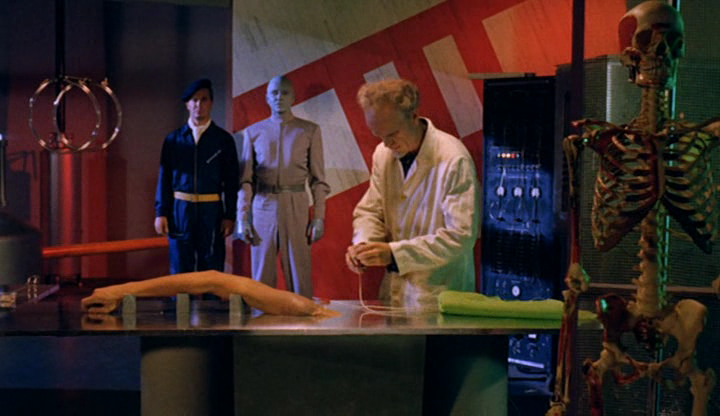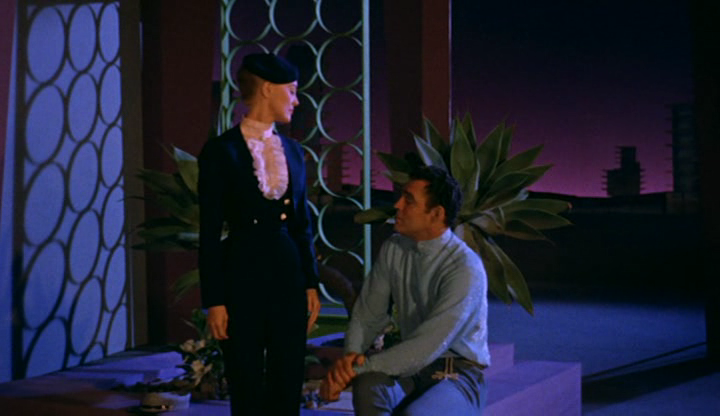
END—Point of beginning, Webster.
Let's be honest: you're never going to watch Creation of the Humanoids, a 1962 zero-budget sci-fi stiff hand-tooled by loving amateurs, in which inept actors, including cult icon Dudley Manlove (Plan 9 From Outer Space: "Stupid stupid stupid!") stand stock-still for minutes at time, mouthing unspeakable dialogue.
But let's not be honest, let's be optimistic: you might be tempted. On learning that this was Andy Warhol's favourite film (pop fact number one) or that it anticipates all the most interesting ideas of Blade Runner (by twenty years) or that it achieves a kind of reeling, coshed euphoria through shuffling between genius and ineptitude at 24fps (blink fast and miss the good bits, blink fast starting one frame later and miss the bad bits), you might seek this movie out. It can be obtained.
So we have to proceed carefully, with spoiler-free observations above the fold and devastatingly ruinous plot revelations below.

This Straddling News
Background: and I don't mean the day-glo painted cityscapes, Jetsons backdrops whose neo-brutalist simplicity—you can practically see the brush-strokes—are rendered with passionate vibrancy by the colour cinematography (can any human expression equal the romantic allure of the phrase "Color by General Film Services"?). I mean the story of how this film came to be. Well, we don't know much. Adapted from a novel by Jack Williamson, a prolific SF scribe with a sixty-year career stretching from thirties pulp to the nineties, the movie was produced and directed by Wesley Barry, a former child actor who had co-starred with Mary Pickford before launching a directing career in TV, without apparently acquiring any skills in either camera blocking or the direction of actors. Consequently, the characters in Humanoids tend to enter a scene and strike a pose, which they maintain until absolutely forced to move by contingencies of plot. Rooted to the floor and declaiming as stentoriously as possible (radio announcer Manlove is particularly good at this), they all come across like robots, which is oddly effective, since most of them are.
B-movie and TV hack Jay Simms does slightly better on script, since he has an exciting and ideas packed novel to work from. In a post-nuclear world, mankind is threatened with extinction by radiation-induced sterility, and the fascistic Flesh and Blood League oppresses the humanoid robots, who may be plotting to supplant their masters. With startling and taboo ideas flying around, including at least one phildickian mindfuck every thirty minutes, the lack of movement doesn't altogether kill interest. Simms' Ed Wood type dialogue veers from the inept to the oddly effective: "...the shock of dying, and being resurrected as a robot, was too severe: they re-died," intones Dr. Raven, whose outsized cranium does not altogether convince us of his brilliance. Simms, delightfully, ended his career on a high note of sorts, scripting John Ford's last movie, the one that sounds like a porno—Chesty: Tribute to a Legend.
The biggest professional on the show is Jack Pierce, makeup supremo who once crafted the Frankenstein monster's iconic look. His refusal to embrace the new technology of latex, coupled with an unbending Teutonic temperament and a drinking problem, had driven the great magician to pack up his collodion and cotton wool and leave Universal Studios for the open market, where he was swiftly reduced to... well, to this: bald-cap duty, painting hams blue and fitting them with excruciating metallic contact lenses. (See also: Edgar Ulmer's Beyond the Time Barrier—Pierce missed the chance to decorate Ulmer's mutants because he was on a bender, but he did turn up to lovingly age the leading man into time-warped decrepitude.)
The other factor that recommends this film to the heavily opiated is probably the sheer lack of drama, which is closely related to the static direction, cumbersome and protracted dialogue, and also the stilted performances. Those actors who don't sound as if they're reciting the football results frequently sound either uncertain or drunk, like the guy who mispronounces the phrase "this startling news." But Don Megowan, as "The Cragis" (he's dropped his first name, the sensible-sounding Kenneth, in favour of the definite article, since he's the last of his family line) is quietly effective, like a sedated Robert Ryan. Cragis is part of the robot-hating secret society, although his fascistic tendencies are softened by our knowledge of his low sperm count. The first stretch of the "plot" concerns his efforts to uncover a scheme to infiltrate the human race with mechanical lookalikes. Meanwhile, he's caught in a scandal when his sister turns out to be engaged in "rapport" with her domestic robot, whose contact lenses and wig grant him a lifelike loverboy look, and whose programming harmonizes him with his mistress's every wish, making him the perfect combination butler-vibrator. At the end of one beautifully verbose, interminable scene, the two move in for a kiss and Barry swiftly dissolves to the next gabfest as if we were about to see some beastly interracial offense: proof that the makers of the movie really take their own ideas seriously. We must be protected from this hot woman-on-robot action.
And then the story clicks up a notch—

And Introducing Don Doolittle as Dr, Raven
Because, you see, many moons before Ridley Scott's director's cut of Blade Runner, both "The" and his new girlfriend (natty skeleton Erica Elliott) turn out to be robots themselves, robots who think they're human, programmed as they are by "thalamic implants" which grant them the memories of deceased humans. More embarrassing still, it turns out that "The," shortly before keeling over from a brain embolism, had planted the bomb which killed the woman who is now the robot he loves. Fortunately, in the best B-movie tradition, this devastating blow to the relationship is swiftly forgotten. The shock revelation that both characters are dead/reanimated robots, probably helps her disregard the unfortunate coincidence that her boyfriend murdered her in her previous life.
"We also made you a little thinner. You were inclined to be plump," robo-Manlove tells the emaciated heroine.
"Oh yes. I remember: my clothes didn't fit," muses Elliott. "Thank you."
Well, that's something, anyway.
Side-stepping any drama or emotion, the movie, oozing Thorazine from every pore, drags itself towards a glassy-eyed finish, throws one final brain-spanner into our collective consciousness. As Dr. Doolittle announces his attention to fix up his new humanoids' genitals to make a viable breeding pair of them, thus saving the human race through the machines that will replace it (the big idea of Kubrick/Spielberg's A.I. is dealt with in under a minute), he turns to address us, the audience, with steely benevolence: "Of course, the operation was a success...or YOU wouldn't be here."
Thanks to Edinburgh Film Guild.

***
The Forgotten is a regular Thursday column by David Cairns, author of Shadowplay.